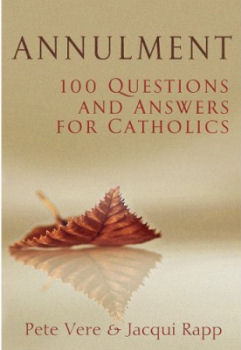
|
Posted March 15, 2010
Book: Annulment: 100 Questions and Answers for Catholics Authors: Pete Vere & Jacqui Rapp Servant Books: St. Anthony Messenger Press. Cincinnati, OH. 2010. Pp. 117 An Excerpt from the Jacket:
— Aren’t annulments just Catholic divorce? — Do I need to hire a lawyer? — How much does the process cost? — If the Church annuls my marriage do my children become illegitimate? — How do “psychological grounds” affect a person’s ability to validly contract marriage? Canon lawyers Pete Vere and Jacqui Rapp answer these and many other questions in everyday language free from legal jargon. They make the annulment process less intimidating and open the door to healing for all those affected including friends and family members who want to offer informed support during a difficult time. An Excerpt from the Book: What are “psychological grounds,” and do they affect a person’s ability to contract marriage validity? A person must be capable of giving consent if he or she wishes to enter into marriage. Canon 1095 establishes grounds by which an individual lacks the capacity to give consent. The canon is broken down into three paragraphs, with each paragraph defining a different way in which an individual may lack the capacity to give consent. These three are a lack of sufficient use of reason, a grave lack of discretion of judgment, and an inability to assume the essential obligations of marriage due to a psychological issue. . . .I often hear the expressions “canon 1095 annulments” and “lack of due discretion.” What do these expressions mean, and how do they affect marriage consent? In the U.S. and Canada, the vast majority of marriage cases are investigated under paragraph 2 of canon 1095. This canon deals with a grave lack of discretion of judgment on the part of an individual concerning the essential right and obligations of marriage. In simple terms, it is the inability of a person to critically evaluate self, the other person or the relationship when choosing marriage. A grave lack of discretion of judgment can arise because of serious immaturity, unresolved family of origin issues, relational issues or psychological issues. The classic example used by canon lawyers to illustrate these groudns is that of two teenagers from broken and abusive homes who, six weeks into their courtship, purposely become pregnant to force a wedding. They see marriage not as a mature lifelong partnership but as an escape from a difficult home life. Neither party has maturely reflected upon marriage, it responsibilities, one’s ability to undertake this relationship or the ability of the intended spouse to enter this relationship. Rather, the decision is impetuous and immature. Table of Contents: 1. General questions about annulments 2. The meaning of marriage 3. Marriage preparation in canon law 4. Impediments to marriage 5. A matter of consent 6. Who’s who in an annulment case? 7. Formal process for a declaration of invalidity 8. Other opinions 9. Concluding thoughts on keeping your marriage together |
|
